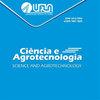水杨酸缓解生理盐水胁迫对酸腐病形态学的影响
IF 0.9
4区 农林科学
Q2 AGRICULTURE, MULTIDISCIPLINARY
引用次数: 16
摘要
摘要近年来,由于农业综合企业的发展和制药行业的使用,酸豆瓣的种植量有所增加。作为维生素C、钙、碳水化合物和抗氧化物质的来源,酸味剂有助于保护人体免受氧化应激,预防一系列慢性退行性疾病。在这种情况下,本研究的目的是评估水杨酸叶面喷雾减轻盐胁迫对酸浆形态生理学的影响。该研究在温室中进行,采用随机区组设计和5×4析因安排,灌溉水的电导率为五个水平——ECw(0.8对照;1.6;2.4;3.2和4.0 dSm-1)和四个浓度的水杨酸SA(0;1.2;2.4和3.6 mM),共三个重复。在移植后480天,1.2至1.6mM浓度的SA的叶面施用减轻了盐胁迫对酸性土壤气孔导度、CO2同化率、蒸腾作用和瞬时羧化效率的影响。喷洒浓度在1.3和1.6mM之间的SA诱导了酸腐植物对盐胁迫的适应,因为即使暴露在盐度下,SA的应用也降低了细胞间电解质渗漏的百分比,并且有利于生长。ECw在0.8dSm-1以上的灌溉降低了Morada Nova酸豆叶片的相对含水量。本文章由计算机程序翻译,如有差异,请以英文原文为准。
Salicylic acid relieves the effect of saline stress on soursop morphysiology
ABSTRACT The cultivation of soursop has increased in recent years due to the advance of agribusiness and due to its use by the pharmaceutical industry. As a source of vitamin C, calcium, carbohydrates and antioxidant substances, soursop helps to protect the human body against oxidative stress, acting in the prevention of a series of chronic degenerative disorders. In this context, the objective of present study was to evaluate the effects of foliar sprays with salicylic acid to mitigate the effects of salt stress on the morphophysiology of soursop. The study was conducted in a greenhouse, in a randomized block design and a 5 × 4 factorial arrangement, with five levels of electrical conductivity of irrigation water - ECw (0.8-control; 1.6; 2.4; 3.2 and 4.0 dS m-1) and four concentrations of salicylic acid - SA (0; 1.2; 2.4 and 3.6 mM), with three replicates. Foliar application of SA at concentrations between 1.2 and 1.6 mM mitigated the effects of salt stress on stomatal conductance, CO2 assimilation rate, transpiration and instantaneous carboxylation efficiency of soursop at 480 days after transplanting. Spraying with SA at concentrations between 1.3 and 1.6 mM induced acclimatization to salt stress in soursop plants, since the percentage of intercellular electrolyte leakage was reduced and the growth was favored by the application of SA, even when exposed to salinity. Irrigation with ECw above 0.8 dS m-1 reduced the relative water content in the leaves of soursop cv. Morada Nova.
求助全文
通过发布文献求助,成功后即可免费获取论文全文。
去求助
来源期刊

Ciencia E Agrotecnologia
农林科学-农业综合
CiteScore
2.30
自引率
9.10%
发文量
19
审稿时长
6-12 weeks
期刊介绍:
A Ciência e Agrotecnologia, editada a cada 2 meses pela Editora da Universidade Federal de Lavras (UFLA), publica artigos científicos de interesse agropecuário elaborados por membros da comunidade científica nacional e internacional.
A revista é distribuída em âmbito nacional e internacional para bibliotecas de Faculdades, Universidades e Instituições de Pesquisa.
 求助内容:
求助内容: 应助结果提醒方式:
应助结果提醒方式:


